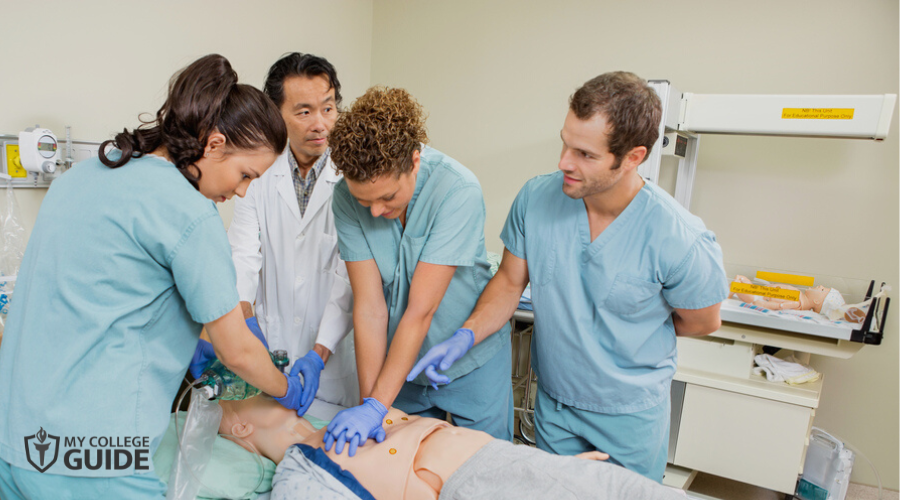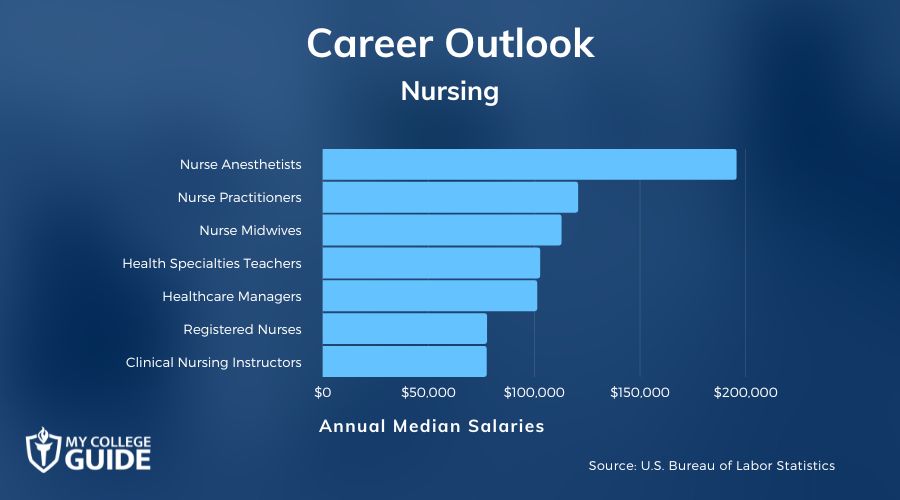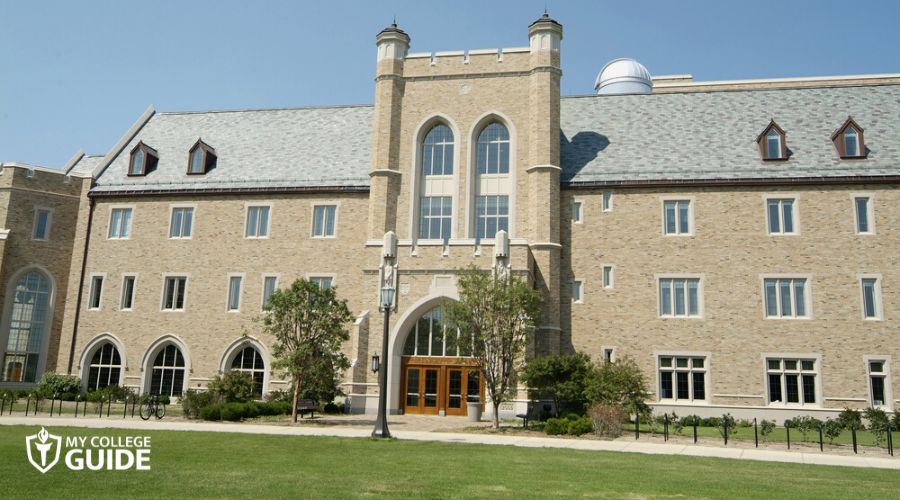If you have a passion for health and serving your community, online nursing programs may be perfect for you! The demand for educated and qualified nurses is at an all-time high across the country.

As our population grows, and individuals live longer and face new and diverse ailments, the need for specialized care increases.
Editorial Listing ShortCode:
While you can enter the field with an associate degree, a more advanced degree can maximize your career and salary potential. The nursing field is designed to encourage ongoing growth and professional development.
Online Nursing Programs
The field of nursing is competitive, and most RNs look to further their education as they begin working in the job force. There are various types of online nursing degrees to consider, including:
- Associate Degree in Nursing (ADN)
- Bachelor of Science in Nursing (BSN)
- Master of Science in Nursing (MSN)
- Post Master’s Nursing Certificates
- Doctorate in Nursing
- Nursing Bridge Programs
After you have your nursing license, additional studies will help you to hone your skills and develop specialized knowledge within a particular subfield of nursing.
Online Associates in Nursing Programs

Earning an Associate in Nursing is often the first step in becoming a nurse. These 2-year RN programs online provide the foundation and can lead to a number of career opportunities.
There are four associate degree options available in this field, including:
- Associate of Nursing (AN)
- Associate Degree in Nursing (ADN)
- Associate of Science in Nursing (ASN)
- Associate of Applied Science in Nursing (AASN)
For students that attend online associate nursing programs full-time, it will take about 2 years to complete these hours. Your program will include general education and nursing courses, like fundamentals of nursing.
Editorial Listing ShortCode:
Once you have completed this program, you can take the National Council Licensure Examination (NCLEX-PN or NCLEX-RN) to become either a licensed practical nurse (LPN) or a registered nurse (RN). As an LPN or RN, you could work in a physician’s office, hospital, psychiatric facility, nursing home, or school.
Online Bachelors in Nursing Programs

Earning a Bachelor of Science in Nursing will provide you with a more comprehensive understanding of the field, and will better equip you to oversee fellow nurses in the workplace.
Editorial Listing ShortCode:
Once you have your RN license, you can work towards a bachelor’s degree in nursing (BSN) by completing the coursework online. This flexibility allows you to continue working as a nurse throughout your studies, making online BSN programs an ideal choice for those who are balancing the demands of work with continuing education.
There are several topics that you will cover throughout your Bachelor of Nursing online program including:
- Medical law and ethics
- Transcultural care
- Health informatics
- Specialized nursing skills
Although the online bachelor in nursing degree coursework can be completed online, depending on the program, you will still be required to attend on-site training as part of your degree program. Typically, 400-900 hours of clinical rotation hours are required over the course of two years.
Online Masters in Nursing Programs

The online master’s degree in the nursing program focuses on specific concentrations that provide you with the skills needed to move up in your career.
Editorial Listing ShortCode:
Courses are typically comprised of general studies, leadership training, and comprehensive skill training in your chosen specialization. There is no hard-and-fast rule about what is required to enter a Master in Nursing program. However, it is common for schools to require the following:
- Bachelor of Science in Nursing (BSN)
- Registered Nursing License (RN)
- Minimum GPA and GRE scores
- Clinical experience
If you are able to attend full-time, it will likely take you 1 to 2 years to earn this advanced degree. As a part-time student, the program could take as long as 4 years. You will cover advanced topics such as resource management, ethics, pharmacology, and acute and chronic illnesses.
With a master’s degree in nursing, you could become a nurse anesthetist helping surgeons, a family practitioner, a nurse-midwife, or a critical care nurse, for example. Or you could work in a leadership or administrative role, as a nurse administrator, research nurse, or nurse consultant.
Online Post Master’s Nursing Certificates

Online post-master’s nursing certificates allow you to advance your skill set and career after receiving your master’s degree.
Editorial Listing ShortCode:
Some programs include:
- Adult-Gerontology Primary Care NP: Teachers the skills required to provide quality and comprehensive care for patients 13 years and older.
- Family Nurse Practitioner: With this certificate, you can provide quality care to your own patients. You’ll learn how to manage disease prevention and practice health promotion.
- Nursing Education: Dive into the world of education and help others by educating nurses and preparing them for success with their patients.
- Nursing Informatics: This certificate program teaches you to use information technology to make quality decisions in healthcare and medical settings.
- Psychiatric-Mental Health Nurse Practitioner: You will learn how to assess, diagnose, prescribe medications, and provide therapy to patients that suffer from mental, brain, or substance abuse disorders.
It’s important to choose a certificate program that fits your skills and suits your career goals and interests.
Online Doctoral Programs in Nursing

If you are already a seasoned nurse and want to advance or alter your professional path, you may wish to pursue a doctorate. This is the highest level of education available in the field.
Editorial Listing ShortCode:
When pursuing a doctorate nursing program, t is common for schools to require the following:
- Bachelor of Science in Nursing (BSN)
- Registered Nursing License (RN)
- Minimum GPA and GRE scores
- Clinical experience
There are two distinct doctorate paths:
- Doctor of Nursing Practice (DNP): This is a professional degree for those who wish to advance their clinical skills in a specific area of nursing or a leadership role. Focuses on leadership, evidence-based practice decisions, and advanced specialty care.
- Doctor of Philosophy (PhD): This is a research degree for someone who wishes to pursue a position in an academic or research setting. Focuses on illness trajectories and care systems. Classes will cover advanced theory, research methodology, data analysis, and more.
Doctorate programs typically take 3 to 6 years to complete.
Nursing Bridge Programs

Bridge programs leverage a student’s educational and professional experience. While traditional nursing degree programs require students to complete hours of clinical, a bridge program may count your previous professional experience in place of clinical hours.
Editorial Listing ShortCode:
Take a look at three of the most common bridge programs below:
- RN/LPN to BSN (ADN-to-BSN): If you are a practicing LPN or RN but do not yet hold a bachelor’s degree, this bridge program can help you earn your next degree quickly and can open the door to many more job prospects. As a full-time student, the RN-to-BSN program typically takes about 1.5 to 2 years to complete.
- RN to MSN (ADN-to-MSN or BSN-to-MSN): This program is available to registered nurses who hold either an associate degree (ADN) or a bachelor’s degree (BSN, or a bachelor’s degree in an unrelated field). An ADN-to-MSN program will generally take about 3 years to complete. A BSN-to-MSN bridge program will take at least 4 years of full-time study.
- BSN to DNP: Through this bridge program, students who hold a bachelor’s degree in nursing can earn both a master’s and a doctorate at the same time. This program will typically take 3 to 4 years on a full-time basis.
The goal of a bridge program is to advance quickly without repeating what you already know. The schedule is flexible, so as to work around irregular nursing hours.
Nursing Careers & Salaries

Nurses are essential to the functioning of any medical facility, and because of this, there are countless ways to create a nursing career that suits your specific interests and skills.
Below, we have highlighted a few of the popular nursing career paths and their annual median pay according to the U.S. Bureau of Labor Statistics (BLS):
| Careers | Annual Median Salaries |
| Nurse Anesthetists | $195,610 |
| Nurse Practitioners | $120,680 |
| Nurse Midwives | $112,830 |
| Health Specialties Teachers, Postsecondary | $102,720 |
| Healthcare Managers | $101,340 |
| Registered Nurses | $77,600 |
| Clinical Nursing Instructors | $77,440 |
| Healthcare Social Workers | $60,840 |
| Licensed Practical Nurses | $48,070 |
| Nursing Assistants | $30,310 |
Healthcare professionals are always in high demand, and the aging population and advancements in the medical field are only increasing the job stability for these professions.
Across all fields of healthcare, the BLS predicts a 13% occupational growth for the next decade. Additionally, the BLS projects occupational growth for registered nurses to increase by 6% within this time frame. With a much higher than the average growth rate, a nursing career is a solid choice for a stable, long-term occupation.
How to Choose an Online Nursing Program

To be able to give the best care for a wide variety of patients and provide quality treatment in challenging scenarios, it is vital that your nursing education is completed at a reputable university.
To help you make the decision about whether an online degree program is right for you, consider the following factors during the course of your research.
- Accreditation: With all degree programs, accreditation is important. However, when it comes to healthcare careers, it is even more imperative that you are working towards a degree with a college that has a stellar reputation for quality academics.
- Student-to-Faculty Ratio: One way to ensure that your college is focused on quality education is by looking at the typical student-to-faculty ratios for their nursing courses. The lower the ratio, the higher the chance you have of getting the individualized education experience that you need to succeed.
- Academic Advising and Student Services: In addition to the courses required, it is important to have a solid understanding of the academic advising and student services your college of choice offers.
- Nursing Internships: Programs that offer clinical rotations or nursing internships can set you on the right path toward your career. Not only can you gain hands-on experience but also make connections for future opportunities.
- Cost: The cost of each program is also an important factor. Compare various programs to see which one fits your budget.
Through flexible online programs and clinical rotations, online nursing degrees allow working students to achieve their career goals in a time frame that fits into their busy lives.
How to Become a Registered Nurse

Nursing is among the most common jobs in the United States with over three million registered nurses in the country. The process to become a nurse may include many steps, depending on the type of nurse you wish to become.
If you are interested in becoming a registered nurse, there are several steps to take:
- First, consider what your overall goals and career aspirations in nursing may include.
- Once you have decided upon a professional path, you should apply to an accredited nursing program, such as RN online program, an associate’s degree in nursing program (ADN), or a bachelor’s degree in nursing program (BSN).
- After earning your degree, you may wish to study for the NCLEX-RN (National Council Licensure Examination for Registered Nurses).
- Next, set up a time to take the NCLEX-RN. In most cases, nurses are required to pass this test in order to become licensed.
- Finally, you’ll apply for state licensure. Each state has its own requirements for this, so be sure to research the specific requirements of the state in which you wish to practice.
Bear in mind that each state also sets its own guidelines on the type of licensing and how often an RN needs to renew their license. Additionally, some nursing specialties ask students to complete certain certifications. You may wish to investigate the requirements for these credentials, as well.
Nursing Online Programs Accreditation

When researching online programs for nursing, you may wish to focus your search on schools that have received accreditation from the Council for Higher Education Accreditation, or CHEA.
Editorial Listing ShortCode:
CHEA accreditation is awarded to programs that have been evaluated for their high academic standards. As a result, some financial aid or scholarship opportunities may require students to attend an accredited program. Additionally, future employers and professional organizations may prefer candidates who have graduated from an accredited program.
CCNE Accreditation for Online RN Programs
The Commission on Collegiate Nursing Education (CCNE) is the accreditation agency for nursing programs. To become accredited through the CCNE, schools pay fines and go through an aggressive application process. This ensures that the accredited nursing practitioner online programs are operating with the quality expected from the CCNE.
Programs will send Continuous Improvement Progress Reports periodically to remain accredited, with a maximum accreditation period of five years. Attending a program that has received CCNE accreditation may be beneficial for future licensing and certifications, as well as being preferred by employers.
Nursing Licensure and Certifications

The three types of nursing licenses are Registered Nurse (RN), Licensed Practical Nurse (LPN), and Advanced Practice Registered Nurse (APRN).
If you wish to become licensed, here are some of the most common steps you should follow:
- Pass a background check.
- Earn a degree from an accredited nursing program.
- Sit for the NCLEX.
- Apply for licensure in the state in which you wish to practice.
- Pay your licensing fee once you are accepted.
- Renew your license as needed.
Licensing requirements vary from state to state, so you may wish to review the requirements for the state in which you plan to practice.
Financial Aid and Scholarships

Students who are interested in needs-based financial assistance may want to start by completing the FAFSA, or Free Application for Federal Student Aid. This application is the first step in receiving Federal student loans.
You may also wish to investigate scholarship and grant opportunities. Many schools offer a variety of financial awards that are offered to students based on academics, athletics, or financial status. Other options include work-study programs, tuition assistance programs offered by an employer, and loans and financing offered through your school.
Is an Online Degree in Nursing Right for Me?

Nursing is a highly respected and rewarding career path as many students find it to be the perfect way to combine their compassion for others with a challenging, fast-paced work environment.
An online degree in nursing may be right for you if you:
- Have good time management skills
- Are passionate about helping others
- Have the desire to work in the healthcare field
- Have patience and empathy toward others
- Thrive in a fast-paced environment
If these qualities sound like you, an online nursing degree may be an ideal choice.
Are Online Nursing Degrees Respected?

A nursing degree received from an accredited program will earn respect from employers and professional organizations alike.
You may also be asked to complete licensing and certification, for which you will be eligible with an accredited degree. Online students still spend clinical hours in person, while enjoying the freedom an online classroom allows. Online nursing programs are evaluated for accreditation in the same exact manner as in-person nursing programs, as well.
Editorial Listing ShortCode:
Future employers are frequently interested in candidates who graduated from a school with an accredited nursing program, not whether they earned the degree online or in person.
What Can You Do With a Degree in Nursing?

According to the BLS, registered nurses work in a variety of settings, such as hospitals, physician’s offices, home health care, nursing care facilities, schools, and outpatient clinics.
Some of the different types of nurses include addiction nurses, cardiovascular nurses, critical care nurses, genetics nurses, neonatal nurses, public health nurses, and rehabilitation nurses. There are various other types of nurses in addition to those listed, including Clinical Nurse Specialists, which is a type of advanced practice registered nurse.
Is Online Nursing School Hard?

Attending nursing schools online can be challenging and rewarding for many students. You may wish to consider some different types of classes that a nursing student will need to take when determining if this degree program is right for you.
Nursing programs rely heavily on scientific subjects such as biology and chemistry. Mathematics, sociology, and psychology are also covered while working to obtain a nursing degree. You will also be expected to take courses on basic nursing care, pharmacology, and communication. Should you select a specialized nursing field as a long-term goal, you may be asked to take additional courses.
How Long Does It Take to Become a Nurse?

The time it takes to become a professional nurse can vary, depending on the type of nursing you choose for your career and which nurse colleges online you choose to attend.
The steps to becoming a nurse may include:
- Licensed Vocational Nurse (LVN): Once you have obtained a high school diploma or its equivalent, you may pursue an LVN educational program, which usually takes about a year to complete.
- Registered Nurse (RN): The quickest degree program toward becoming an RN is an associates Degree in Nursing (ADN), which can typically be completed within two years.
- Bachelor of Science in Nursing (BSN): An RN to BSN can be completed in two years.
Once you have completed the educational program required by the type of nurse you wish to become, you may be eligible to sit for the proper NCLEX exam.
Is a Nursing Degree Worth it?

Yes, a nursing degree is worth it for many students. RNs will continue to be in high demand due to the occurring nursing shortage.
Editorial Listing ShortCode:
Nursing will likely always be an important profession, and the demand for nurses continues to grow. The BLS states that over the next decade, the job market for registered nurses will grow at an above-average rate. Given the range of specialties for nurses and the variety of nursing fields, professional licensed nurses will continue to be an important part of the medical community.
Universities Offering Online Bachelors in Nursing Degree Programs
Methodology: The following school list is in alphabetical order. To be included, a college or university must be regionally accredited and offer degree programs online or in a hybrid format.

AdventHealth University offers an online program for a Bachelor of Science in Nursing that aims to provide a welcoming learning community. The curriculum emphasizes compassion and a holistic approach to healthcare. Various support services and networking opportunities are available. Students who are already RNs can potentially earn their BSNs in just 1 year.
AdventHealth University is accredited by the Southern Association of Colleges and Schools Commission on Colleges.

Arizona State University offers an online Bachelor of Science in Nursing: RN to BSN program. It requires the completion of 10 classes. Each course is 7.5 weeks long. Potential courses include Nursing Research and Evidence Translation, Professional Nursing Theory, and Health Promotion Across the Life Span.
Arizona State University is accredited by the Higher Learning Commission of the North Central Association of Colleges and Schools.

Franklin University offers a BS in Nursing (RN-BSN). Courses can be completed online in 6 or 12 week blocks. The program can potentially be completed in just 1 year. Potential courses include Health Informatics, Health Policy, and Health Assessment and Promotion. Courses utilize simulations and virtual activities and are taught by instructors with real-world experience working in healthcare.
Franklin University is accredited by the Higher Learning Commission.

Grand Canyon University’s RN to BSN degree program uses 5 week online courses and can potentially be completed in just 14 months. The program offers access to a counseling team and other resources. Practicum hours may be completed locally.
Grand Canyon University is accredited by the Higher Learning Commission.

Herzing University offers an online BSN program designed for students who are not already licensed RNs. Lectures are available live and recorded. The program provides opportunities to gain hands-on experience through clinicals and on-campus intensives. It also offers the opportunity to earn dual credits toward an MSN degree. The program can potentially be finished in 3 years of full-time study.
Herzing University is accredited by the Higher Learning Commission.

Indiana University’s RN-to-BSN degree completion program is available online. This flexible program can potentially be completed in 1 year of full-time study. Each course is 8 weeks long, and one or two courses are typically taken at a time. Some courses may require clinical experiences or practicums. Potential courses include Health Policy, Informatics, and Applied Healthcare Ethics.
Indiana University is accredited by the Higher Learning Commission.

Liberty University offers an online RN to BSN degree program. Courses use an 8 week online format, and on average, it takes 2.5 years to graduate. The program offers multiple start dates every year, and courses have no set login times to help provide maximum flexibility for working professionals. The program’s instructors have on-the-job experience in healthcare.
Liberty University is accredited by the Southern Association of Colleges and Schools Commission on Colleges.

Maryville University’s online RN to BSN program has six start dates every year. Courses are designed to encourage discussion and collaboration among classmates. The program requires the completion of 89 credits. Graduates may pursue work in a variety of healthcare settings, including hospitals, private practices, and nursing homes.
Maryville University is accredited by the Higher Learning Commission.

McKendree University offers an RN to BSN online degree program. It aims to provide a supportive community and the flexibility to accommodate varied schedules. Each course is 8 weeks long, and it is possible to graduate in just 3 semesters. The program requires participation in two practicum experiences.
McKendree University is accredited by the Higher Learning Commission.

Northern Illinois University offers an online BS in Nursing for RNs program. Start dates are offered in the fall, spring, and summer, and students may work at their own pace according to their own schedules. Each student is assigned a dedicated advisor to help ensure they meet all the graduation requirements.
Northern Illinois University is accredited by the Higher Learning Commission.

Ohio State University offers an online RN to BSN program. Courses are asynchronous, with no set login times. The program requires the completion of 25 credit hours and offers 12 month, full-time and 15 month, part-time plans of study.
The Ohio State University is accredited by the Higher Learning Commission.

Ohio University’s RN to BSN program is available online to fit busy schedules. Courses are 5 weeks long, and there are eight start dates offered each year. The courses are conducted in a mostly asynchronous format, allowing students to study when it is most convenient. The program can potentially be completed in 12 months.
Ohio University is accredited by the Higher Learning Commission.

Purdue University’s Bachelor of Science in Nursing: RN-to-BSN program is available online. Each course is 10 weeks long and typically requires a time commitment of 15 to 18 hours per week. Students may work according to their own schedules and choose the location for clinical experiences. The program can potentially be finished in 18 months.
Purdue University is accredited by the Higher Learning Commission.

Rivier University offers a BS in Nursing—RN to BSN online program. Courses are 7 weeks long, and the full program usually takes 1 to 2 years to complete, depending on whether one or two courses are taken at a time. The curriculum emphasizes patient-centered, evidence-based practice.
Rivier is accredited by the New England Commission of Higher Education.

Southern New Hampshire University offers an online RN to BSN program. There are no set class meeting times, and coursework can be accessed all day, every day. Clinical experiences may be completed locally. Applications are accepted year-round, and the program offers six 8 week terms a year.
SNHU is accredited by the New England Commission of Higher Education, Inc.

Touro University—Nevada offers an online RN-Bachelor of Science in Nursing program with no travel requirements, so students may continue working while earning the degree. There are three start dates offered each year, and the program can typically be completed in 1 year. Students progress through the program with a cohort.
Touro University Nevada is accredited by the WASC Senior College and University Commission.

The University of Alabama offers an online Bachelor of Science in Nursing (RN-to-BSN) program. The curriculum consists of a practicum and courses such as Nursing Informatics for Registered Nurses and Community Health for Registered Nurses. Prospective students can apply to begin in the fall, spring, or summer.
The University of Alabama is accredited by the Southern Association of Colleges and Schools Commission on Colleges.

The University of Arkansas—Little Rock offers an RN-to-BSN online program. It offers a 12 month track and an 18 month track. Potential courses include Health Assessment I and II, Health Care Economics, and Research and Evidence-Based Practice.
UA Little Rock is accredited by the Higher Learning Commission.

The University of Central Florida offers an RN-to-BSN degree completion program. Coursework can be completed 100% online and is designed to provide the same education that can be received on campus. The program includes virtual simulations and clinical practice experiences, which may be completed locally.
The University of Central Florida is accredited by the Southern Association of Colleges and Schools Commission on Colleges.

The University of Colorado—Colorado Springs offers a BS in Nursing online program with no on-campus requirements. Coursework may be completed according to one’s own schedule, and clinical experiences may be completed locally. Courses are 8 weeks long, and there are start dates offered throughout the year.
UCCS is accredited by the Higher Learning Commission.

The University of Florida offers an RN-to-BSN degree program. Coursework can be completed 100% online. The program is open to Registered Nurses who are licensed in the state of Florida. The curriculum uses virtual simulations and clinical experiences to provide hands-on experience. Clinical experiences may be completed locally.
The University of Florida is accredited by the Southern Association of Colleges and Schools Commission on Colleges.

The University of North Florida offers an RN-BSN bridge track online program that is open to licensed RNs nationwide. Work experience as an RN is not required to apply. Courses are 6 or 8 weeks long, and one to two are typically taken at a time.
The University of North Florida is accredited by the Southern Association of Colleges and Schools Commission on Colleges.

The University of Texas—Arlington offers an online program for a Bachelor of Science in Nursing. Students must have a total of 121 credit hours to be awarded the degree. Of these, 51 credit hours in nursing courses and 3 credit hours in an upper division nursing course are required. Graduates of the program have a pass rate of over 90% on the National Council Licensure Examination.
The University of Texas at Arlington is accredited by the Southern Association of Colleges and Schools Commission on Colleges.

Walden University offers a Bachelor of Science in Nursing (RN-BSN) online program. It can potentially be finished in 14 months. Walden has a dedicated team to help students find practicum placements, and coursework uses interactive simulations to help students learn practical problem-solving skills.
Walden is accredited by the Higher Learning Commission.

Western Governors University’s RN to BSN degree program is available online. Tuition is charged by terms, and each term is 6 months long. Most students can graduate within 2 years. Potential courses include Information Technology in Nursing Practice, Comprehensive Health Assessment, Pathophysiology, and Applied Healthcare Statistics. Required field experiences may be completed locally.
Western Governors University is accredited by the Northwest Commission on Colleges and Universities.
Getting Your Nursing Degree Online

There are many options to consider as you prepare for a future in nursing. Consider the time and money you have to invest now, and know that this is a field that is ever-evolving. However, if you have a passion for helping others and working in the healthcare industry, nursing may be a great choice for you.
Whatever path you choose, earning your nursing degree online can offer the flexibility you need to continue working while earning your degree.
If you’re ready to take the next step in your journey, start researching accredited online schools for nursing today!
